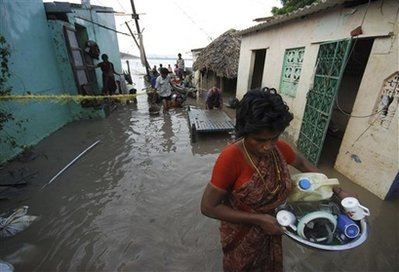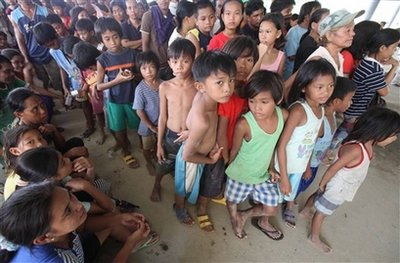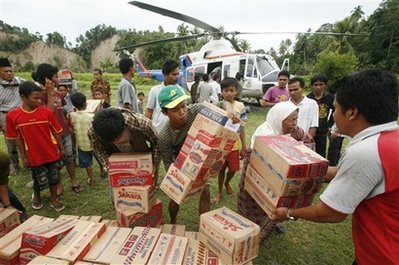Over six million people have been affected by the two devastating storms that recently hit the Philippines, according to the latest figures released by the United Nations.
After 4,125,230 people where left affected by the landfall of Typhoon Ketsana on the capital city of Manila and its greater metropolitan area late last month, over 2,265,000 more were added to the toll when Typhoon Parma hit a vast area northwest of Manila again last Friday, the United Nations reported.
“Even though the immediate effects of these typhoons have passed, we face many months of hard work, relief and recovery and reconstruction ahead,” U.N. humanitarian chief John Holmes told reporters at a news conference in Manila on Tuesday.
Holmes also warned of the serious health threat posed by stagnant water in flooded communities, stressing that it is crucial to get rid of the water rather than waiting for it to recede on its own.
“This crisis is by no means over. In some ways the hard work is just starting,” he stated.
As of Tuesday, the United Nations has secured financial commitments amounting to nearly $19 million out of the $74 million flash appeal it issued last week for the storm victims.
Local and international relief groups, meanwhile, are continuing in their emergency relief efforts while also planning for the long-term reconstruction vital to recovery efforts.
Many of the charities and responders, however, are already stretched thin because of the economy, the latest burst of disasters in Asia, and the ongoing work in other parts of the world, such as Kenya, where some 12 million are suffering thirst, hunger, famine and death amid a critical food crisis and water shortages.
"There's never a good time for one, or two or four disasters, but this year's crises, and the latest Pacific island emergencies, are coming at a really bad time,” reported the Rev. John L. McCullough, executive director of Church World Service.
In addition to the victims of Typhoon Ketsana and Typhoon Parma, relief groups have had tend to victims of the quake-triggered tsunami that hit American Samoa, Samoa and Tonga; the powerful earthquakes that struck Indonesia; and the devastating floods in southern India.
"Disasters are becoming increasingly costly in terms of lives and destruction," commented Melisa Bodenhamer, a Disaster Risk Reduction (DRR) expert with aid agency World Vision.
For Manila alone, World Vision has been globally attempting to raise $2 million to enable a comprehensive response.
Other groups currently providing assistance to the disaster-hit Asia Pacific region include Catholic Relief Services, Caritas Internationalis, Samaritan’s Purse, Lutheran World Relief, and members of Action By Churches International.

















